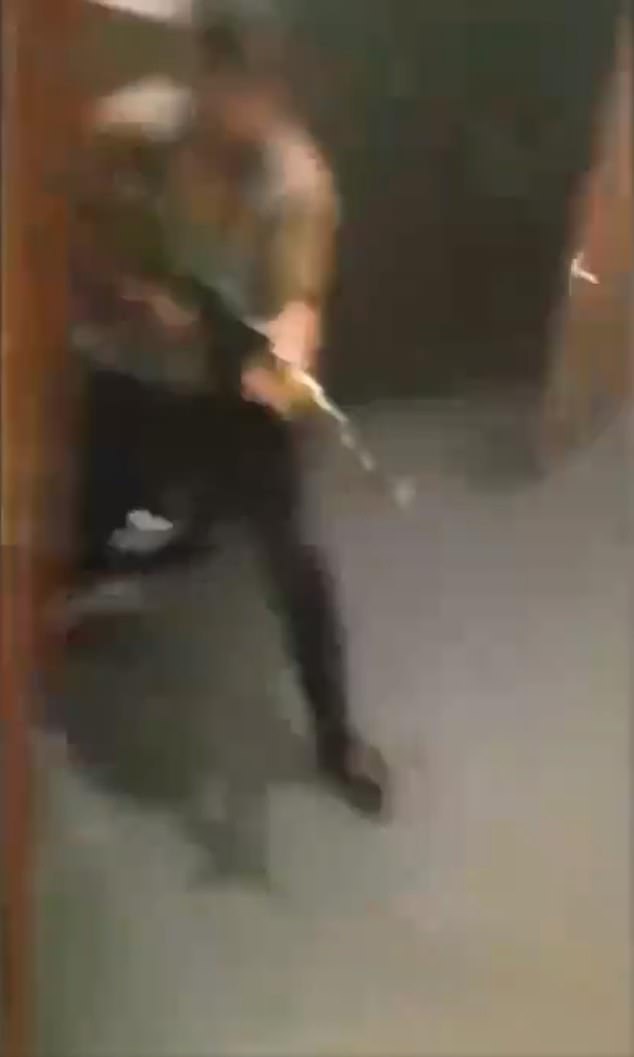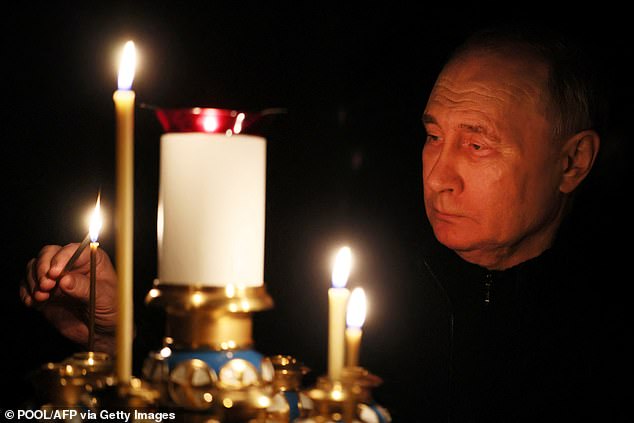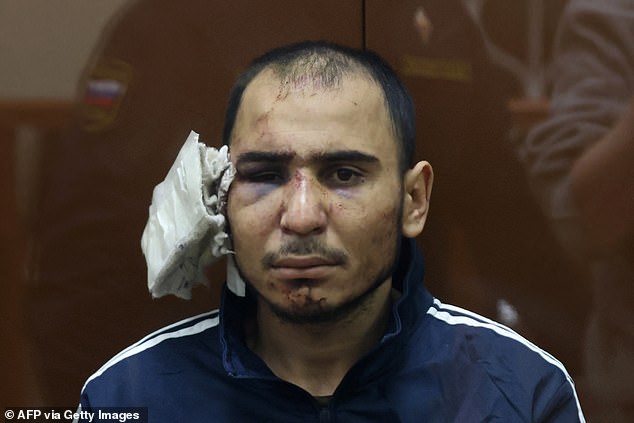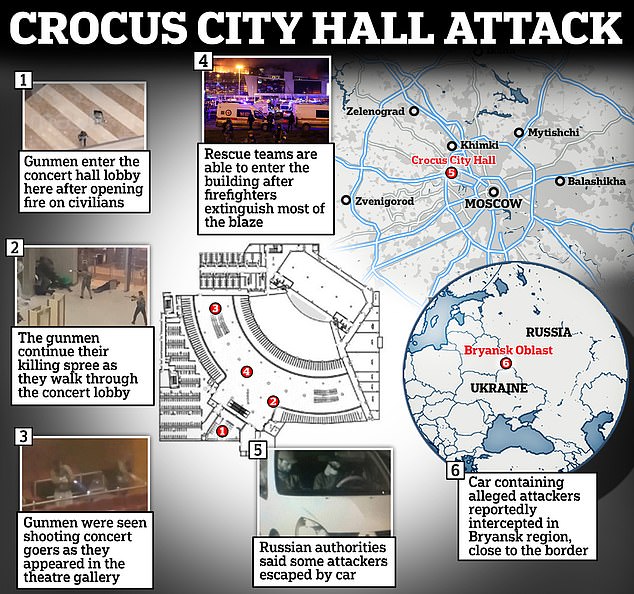MARK ALMOND: Putin looks impotent – that’s dangerous for Ukraine and the West… Saving his own skin at huge human cost is now his strategy
Three days after witnessing the most devastating terrorist attack in their country in years, the Russian people are in mourning. And the West is waiting for the Kremlin’s next move.
While an offshoot of the Islamic State (ISIS-Khorasan or ISIS-K) has emphatically claimed responsibility for the massacre of 137 people in Moscow on Friday evening, Vladimir Putin has insisted that Ukraine was responsible.
On Saturday, in his first public speech after the massacre, the Russian president failed to mention IS fully, instead stating that “the Ukrainian side” had “prepared a window” for the terrorists to flee to that country after the attack.
However, US intelligence insists it has “no reason to doubt” that IS was responsible and even warned several weeks ago that such an attack was likely.
Ukrainian President Volodymyr Zelensky has also denied his involvement, saying: “The wretched Putin was silent for a day, instead of reassuring his own citizens, thinking about how he could link this to Ukraine.”
A suspect in the Crocus City Hall shooting on Friday is being escorted to the headquarters of the Russian Investigative Committee in Moscow

ISIS has released a sickening 90-second video showing in graphic detail how its four terrorists slaughtered 140 people

Vladimir Putin lights a candle during his visit to a church at the Novo-Ogaryovo state residence on March 24, as the country celebrates a national day of mourning after the massacre
In any case, Putin clearly hopes to blame Kiev for shoring up domestic support for his ongoing invasion – and to justify escalating the conflict.
Yesterday morning alone, Russia launched 57 cruise missiles at the Ukrainian capital and western city of Lviv.
With Ukraine running low on anti-missile weapons – and US aid blocked by Washington politics and the diversion of weapons to Israel – Russia plans to crush its defenders in a brutal war of attrition.
But despite growing confidence in the Kremlin that victory in Ukraine can be secured, this attack – gruesome enough in itself, with the death toll likely to rise – has made Putin look weak and powerless.
Yes, four suspects have been arrested and charged with committing the shooting. Video footage is circulating showing the men, with their arms tied behind their backs, being tortured by sadistic Russian kidnappers. One was depicted with electrodes apparently attached to his genitals; another was reportedly forced to eat his own severed ear.
But arresting, humiliating and tormenting the alleged perpetrators is too little, too late.
Ordinary Russians will now wonder whether Putin could have stopped the attack before it happened. Were the old KGB man and his security services distracted by focusing on his persistent Ukrainian demand?

Saidakrami Murodali Rachabalizoda, suspected of taking part in the attack on a concert hall, sits in the suspect’s cage with a severed ear believed to have been fed to him.

After all, this is far from the first Islamic terror attack on Russian soil. In 2002, the Moscow theater siege took place, killing 132 hostages – most of them from sleeping gas released by inept Russian special forces. Two years later, 334 people – including 186 children – were killed in the school shooting in Beslan.
Putin used both opportunities to justify intensifying attacks on Islamist Chechen separatists and to crush domestic opposition. His decisive intervention in Syria’s civil war in 2015, backing President Assad against a range of enemies including IS, has further galvanized Muslim extremists against him.
In 2017, the Saint Petersburg metro was bombed, killing 15 people and injuring 45.
And in recent years, Russia has battled IS factions – largely through proxy forces such as the now-disbanded Wagner Group – in countries bordering the Sahara such as Burkina Faso, Mali and Niger, in an effort to undermine Africa’s natural resources. to gain control.
Together, these all helped motivate totalitarian Islamic sects against him. So for all Putin’s belligerence in Ukraine, his most dangerous domestic enemy is almost certainly Islamist terrorism. And that presents him with another problem.
Russia has a huge Muslim population – at least 14 million citizens and millions more migrant workers.
Russian media claim that the four suspects in Friday’s attack are from Tajikistan – a poor, predominantly Muslim country from the former Soviet Union that supplies a large migrant population to Russia.
Putin must desperately prevent tensions from escalating in these communities to avoid escalating more terror attacks or, worse, separatist wars in Russian regions with large Muslim populations.
He may have just won another sham election and murdered his most powerful critic, Alexei Navalny, in an Arctic gulag.
But tens of thousands of Russian soldiers have been killed in a “special operation” that was expected to last a few weeks when it was launched more than two years ago. The war has reached a stalemate, even though long-term conditions favor the Kremlin.
Now a domestic terror attack has shocked his country, tarnished his image as an invincible strongman and emboldened other Islamist extremists in the volatile borderlands of his vast empire.
By blaming this on Ukraine instead of the real perpetrators, he can make a temporary propaganda gain. But stepping up its attacks on Ukraine will only increase the risk of further escalating the conflict – and involving other actors, including NATO.
Saving his own skin at enormous human cost is now Putin’s strategy. Will the Russians fall for his cruel trick?
MARK ALMOND is director of the Crisis Research Institute, Oxford
